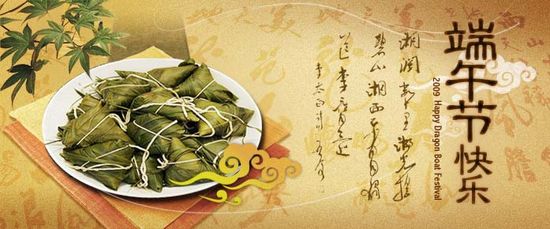端午节为每年农历五月初五,是我国汉族人民的传统节日,这一天必不可少的活动逐渐演变为吃粽子,赛龙舟,挂菖蒲、蒿草、艾叶,薰苍术、白芷,喝雄黄酒。据说,吃粽子和赛龙舟,是为了纪念屈原,所以解放后曾把端午节定名为“诗人节”,以纪念屈原。至于挂菖蒲、艾叶,薰苍术、白芷,喝雄黄酒,则据说是为了避邪。“中国端午节”为国家法定节假日之一,并列入世界非物质文化遗产名录。历代有大量诗、词、歌、赋等文学作品传世。
端午节是古老的传统节日,始于中国的春秋战国时期,至今已有2000多年历史。端午节的由来与传说很多,这里仅介绍以下四种:
源于纪念屈原
传说端午节是为了纪念战国时代楚国诗人屈原,他在五月初五这天投汨罗江自尽殉国。最早出自南朝梁代吴均《续齐谐记》和北周宗懔《荆楚岁时记》的记载。
源于纪念伍子胥
南朝萧梁时期宗懔所著的《荆楚岁时记》,是一部中国古代荆楚地区的岁时节令、风物故事的介绍文集。在该书的第卅节里头记载着:“按五月五日竞渡,俗为屈原投汨罗日,伤其死所,故并命舟楫以拯之……邯郸淳曹娥碑云,五月五日,时迎伍君……斯又东吴之俗,事在子胥,不关屈平也。”认为东吴地区的端午竞渡是为了迎接已被当时人们视为河神的伍子胥,与屈原无关。
源于纪念孝女曹娥
此说出自东汉《曹娥碑》。曹娥是东汉上虞人,父亲溺于江中,数日不见尸体,当时孝女曹娥年仅十四岁,昼夜沿江号哭。过了十七天,在五月五日也投江,五日后抱出父尸。
源于古越民族图腾祭
学者闻一多指出,端午节最重要的两项活动——竞渡和吃粽子,都和龙有关(见闻一多《神话与诗》的《端午考》),可能是迎涛神祭图腾的习俗。相传古代中国南方吴越人(今江浙一带)认为自己是龙的传人,每年五月初五举行祭图腾仪式,以求来年风调雨顺、大丰收。他们把食物裹在树叶里或装在竹子里,投到江里面去。后来他们还有在这天划着独木舟拜访亲朋好友的做法。高兴时就即兴举行独木舟赛,慢慢演变成今天过端午节这种习俗。
过节日,学英语
端午节(农历5月5日)是中国古老的传统节日,始于春秋战国时期,至今已有2000多年历史。
The Dragon Boat Festival, the 5th day of the 5th lunar month, has had a history of more than 2,000 years. It is usually in June in the Gregorian calendar.
端午节吃什么?“粽包分两髻,艾束著危冠。旧俗方储药,羸躯亦点丹。”端午节不可不吃的美味食物就是粽子(tsung-tse)。
粽子tsung-tse:Glutinous rice filled with meat, nuts or bean paste and wrapped in bamboo leaves. It is associated with Dragon Boat Festival with historical meaning.The custom of eating zongzi is now popular in North and South Korea, Japan and Southeast Asian nations.
端午节喝什么?“樱桃桑椹与菖蒲,更买雄黄酒一壶。”端午节尝试一下雄黄酒吧。
Adults drink Xiong Huang Wine, which can fend off evil spirits.
端午节玩什么? “鼓声三下红旗开,两龙跃出浮水来。棹影斡波飞万剑,鼓声劈浪鸣千雷。”端午节最应景的节目就是赛龙舟。
Dragon boat racing is an indispensable part of the festival, held all over the country. As the gun is fired, people will see racers in dragon-shaped canoes pulling the oars harmoniously and hurriedly, accompanied by rapid drums, speeding toward their destination.
端午节戴什么?端午节最有特色的饰物就是香包(sachet)。小孩佩戴香包,传说有避邪驱瘟之意。
On Dragon Boat Festival, parents also need to dress their children up with a perfume pouch. They first sew little bags with colorful silk cloth, then fill the bags with perfumes or herbal medicines, and finally string them with silk threads. The perfume pouch will be hung around the neck or tied to the front of a garment as an ornament. They are said to be able to ward off evil.
端午节挂什么?“不效艾符趋习俗,但祈蒲酒话升平。”
挂艾叶菖蒲 hang branches of moxa and calamus around the doors of their homes.
悬钟馗像 display portraits of evil”s nemesis, Chung Kuei. 都是为了驱疾避凶,讨个吉利。
赛龙舟: 
祝大家端午节快乐 
参考资料:百度百科,互动百科,http://en.huanqiu.com/Language/practical/2011-03/542076.html